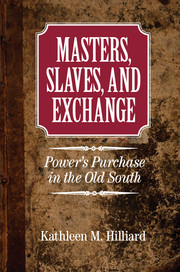5 - Gilt Chains
Published online by Cambridge University Press: 05 June 2014
Summary
“The gift-making seasons were times of pleasure to the children of the family,” Jennie Stephenson recalled thirty years after Appomattox, “as well as to the servants.” The Christmas merriment she described on her father’s Virginia farm typifies depictions of year-end festivities in white southern memoirs. “Father was a firm, but a kind Master,” she insisted, and no moment proved her point better than the holidays. Throughout the long year of work and worry that brought the plantation to harvest time, Charles Friend had guided his servants as a true paternalist, finding his “right to own slaves” in the Bible but feeling the “responsibility physically, morally, and spiritually” to lead them with the good government of a father. He ordered labor – and perhaps lashes too – but also bestowed blessings on marriages, provided medical services, and turned his charges toward church on Sundays. At the end of this year-long “fatiguing duty,” the master’s bounty knew no ebb. Slaves roused the white family early, awaiting a sumptuous morning feast. The “eager faces” of mothers and their “tots” milling around the Big House, marveling at gifts of “lace collars, coffee-mills, and rattles” formed a “bright picture” in memory. Celebration would last throughout the day, Stephenson recalled fondly, until evening’s rituals began. In the “twilight ... all who took part in the harvest” gathered round the door “for money from Master.” Among Stephenson’s dearest memories was the sight of her father “bending over a chair filled with piles of coin, with a list of names in one hand, and with the other counting the money.” While she saw evidence of generosity in this happy scene at day’s end – mothers admiring their tatting, men counting their money, children “somer-sault[ing] on the grass” – more complex calculations were always at work. From the “bright picture” of gifts given in morning to the shadowed scene of payment at night, a politicized spectrum of exchange bookended the day. Embedded within this sentimental portrait of masterly beneficence, Stephenson highlighted her family’s role on this occasion – and in all things – not just as gift givers, but as their slaves’ “white auditors.”
- Type
- Chapter
- Information
- Masters, Slaves, and ExchangePower's Purchase in the Old South, pp. 132 - 153Publisher: Cambridge University PressPrint publication year: 2013



